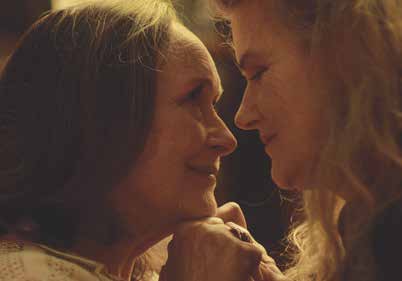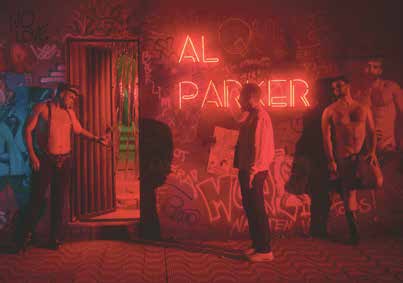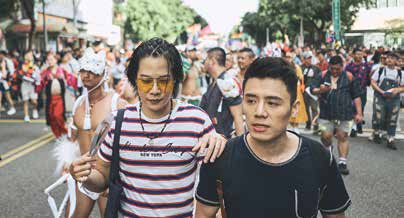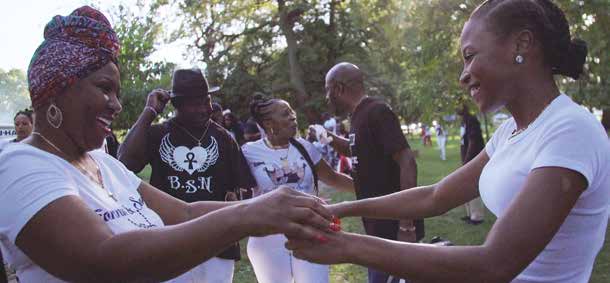
By Gary Kramer–
Frameline 44 ends Sunday, but there are several films worth checking out this weekend. Here is a rundown (in chronological order) of what to watch.
In director Filippo Meneghetti’s poignant drama Two of Us (September 25, 7 pm), aging neighbors Nina (Barbara Sukowa) and Madeleine (Martine Chevallier) are secretly a couple. When circumstances separate the lovers, Nina contrives ways of (re)connecting with Madeline. Meneghetti, making his feature debut, shoots many scenes in close-up, and this intimacy showcases Sukowa’s deeply moving performance as a determined woman in love. Chevallier is heartbreaking, expressing her emotions, sometimes just with her eyes.

Easily the most sexually explicit film at the festival, Dry Wind (September 25, 9 pm), has fertilizer factory employees Sandro (Leandro Faria Lelo) and Ricardo (Allan Jacinto Santana) meeting for raunchy trysts in forests and fairgrounds. But when Sandro spots the sexy, leather-clad Maicon (Rafael Teóphilo), he falls for him instead. The problem is that Maicon couples up with Ricardo. Dry Wind slowly lets this love triangle unfold, showing how jealousy eats away at Sandro. In addition, Sandro has these fetishistic fever dreams—one in a nightclub is particularly erotic, and a scene with a tattooed, muscled cop brims with possibility—that reveal his repressed emotions. Writer/director Daniel Nolasco films Dry Wind in a hypnotic style, with long, lingering, homoerotic shots of the men, but despite all the eye candy, this film can at times feel inscrutable.

Arguably the best film in the festival this year is The Teacher (September 26 1:30 pm), which is part of the Spotlight on Taiwan. Kevin (Oscar Chiu) is a politically-minded high school civics teacher who campaigns for gay marriage on weekends. At a bathhouse, he meets Gao (Sam Chang) and they have a night of passion. Kevin falls hard for Gao, but he has anxiety about the relationship, especially when he briefly loses touch with his lover. Soon after they reconnect, Kevin moves in with Gao but there is a stony silence between the men after Gao discloses that he is positive. Moreover, Gao’s wife Wei (Winnie Shih-Ying Chang)—his lover is still married—is still hoping to have a baby with Gao, causing another rift in their relationship. As Kevin tries to manage this situation, he is targeted by rumors at work. The Teacher is a penetrating character study buoyed by Chiu’s outstanding performance. The actor makes Kevin endearing throughout, but as he becomes more fraught with the pressures of his professional and personal situations, Chiu conveys Kevin’s increasing unease through his coiled body language and taut facial expressions. Scenes with his supportive mother (Tzu-hua Ho) and his gay friend Jo (Simon Shueh) are particularly excellent; he wants to talk with them about his situation, but he does not want to burden them. The Teacher addresses many significant issues facing the LGBTQ community in Taiwan in a compact and provocative and never melodramatic way. This film should not be missed.

In Rurangi (September 26, 3:45 pm) Caz (Elz Carrad) is a transman whose life in Auckland comes crashing down after the death of his lover. He returns to his hometown, Rurangi, reuniting with his estranged father, Gerald (Kirk Torrance), his ex-boyfriend, Jem (Arlo Green), and others who knew him. The experiences the likable Caz has coming out as trans and redeveloping his relationships after a decade away form the narrative backbone, but there are other mini-dramas—such as one involving a local environmental campaign Gerald is waging—that flesh out this absorbing film.
Out gay filmmaker Ferzan Ozpetek (His Secret Life) often makes films about the families created from love not sex, and his newest drama, The Goddess of Fortune (September 26, 8 pm), is no exception. Arturo (Stefano Accorsi) and Alessandro (Edoardo Leo) have been a couple since Annamaria (Jasmine Trinca) introduced them 15 years ago. She asks them to watch her two pre-teens, Martina (Sara Ciocca) and Sandro (Edoardo Brandi), while she checks into the hospital for a few days. However, as the guys navigate temporary parenthood, a situation in their relationship comes to a head. Meanwhile, Annamaria faces an issue of her own. While predictable drama ensues, Ozpetek emphasizes the bonds of love. The feelings the kids have for their “uncles” and vice versa is palpable, and helps this clunky film over its contrived moments.

Homegrown (September 27, 11 am) is a six-pack of locally made shorts. The program opens with the charming documentary, When I Write It. Nico Opper and Shannon St. Aubin’s hangout film has Leila, a queer teen, and her straight friend Ajai taking a mini trip through Oakland. As they ride their bikes and make wry observations—such as one about Earl Grey ice cream—they acknowledge the dramatic changes and cultural shifts in their city. They feel both nostalgia and mournful towards their hometown. Their attitudes reflect their own shift as they enter adulthood. When I Write It also features some performance scenes, and the music, like the film, creates an infectious experience. Another strong documentary is That Was Ray, about Reverend Ray Broshears, who founded the Lavender Panthers, an armed activist/vigilante group—the Reverend carried a shotgun!—to protect LGBT folks who were targets of gang and police brutality. This loving tribute restores Ray’s almost-forgotten legacy with photographs, newspaper accounts, archival footage, and animation as well as through interviews with folks who knew him. Carving Space is an upbeat documentaryabout Unity Skateboarding, an Oakland organization that fills a void for queer, female, and non-binary skaters throughout the country. Director Annie Dean-Ganek celebrates how Unity has built a strong community and expanded a subculture. Aye, Boy, the solo fiction film in the program, is also the weakest. High schooler Mads (Yhana Sibelle) has an abusive father and a crush on her female best friend. The place she feels most comfortable is on the basketball court with the guys. Writer/director My-Hanh Lac’s film is well meaning, but the valuable story of oppression and self-expression is undone by its amateurishness. Eleven Weeksis a bittersweet documentary portrait of the last three months of Carla Jean Johnson’s life. Diagnosed with terminal cancer, she opts against treatment. Her wife Anna Kuperberg (who co-directed this short with Julie Caskey) films various moments, from memories of trips they took, to visits from friends. This is a moving portrait, with artful shots of Carla Jean in bed, or the bathtub, that shows the dignity of dying on one’s own terms. Closing out the program is another poignant documentary, I’ll Cry Tomorrow. Using found-footage from 1986, director Brett Thomas’ eloquent short recounts his experiences as an out 21-year-old gay man in San Francisco during the height of the AIDS crisis. His narration, which unfolds over superimposed images of people and cityscapes, talks about the fear, demonization, and resilience of the LGBTQ community during this uncertain time. It is both heartfelt and galvanizing.

One of the more topical films screening at Frameline is the cogent documentary Unapologetic (September 27, 2 pm), which profiles Janaé Bonsu and Bella Bahhs, two queer Black women in Chicago who are part of the Black Youth Project 100 activist group. The film opens with a powerful action of the BYP100 disrupting white brunches to protest police violence. The women seek justice in the case of Rekia Boyd, a young Black woman who was shot and killed by an off-duty cop. Filmmaker Ashley O’Shay also shows Janaé working on her dissertation and visiting her queer mother, Stacey. Meanwhile, Bella, a rapper, contends with the trauma of family members in prison and seeks a grant to organize full time. Unapologetic provides uplift as Bella leads protests or Janaé speaks out in meetings. Their efforts to serve and represent their community—which has long felt unheard, and oppressed—is inspiring.

Lastly, Alice Júnior (September 27, 4 pm) is a wonderful, energetic comedy from Brazil about the title character (Anne Celestino), a never-been-kissed trans teenager whose father Jean Genet (Emmanuel Rosset) moves to a small town for a few months. Alice despairs when she must attend a Catholic high school and is asked to dress as a boy. Her humiliations multiply at school, but she does make some friends, including Taisa (Surya Amitrano) and Viviane (Thais Schier). She also develops a crush on Bruno (Matheus Moura). Alice Júnior peppers its engaging heroine’s experiences with lively animation and videos, but it is her father’s unconditional love and protection—he is proud of his daughter and fights for her rights—that make the film so gratifying. Watching Alice transform the school, lobbying for bathroom rights, fighting off bullies, and raising feminist consciousness at a pool party, is amusing, heartwarming, and empowering.
© 2020 Gary M. Kramer
Gary M. Kramer is the author of “Independent Queer Cinema: Reviews and Interviews,” and the co-editor of “Directory of World Cinema: Argentina.” Follow him on Twitter @garymkramer
Published on September 24, 2020
Recent Comments